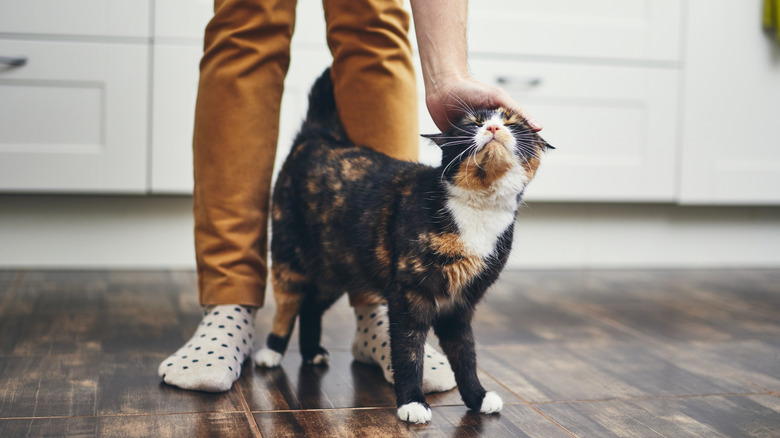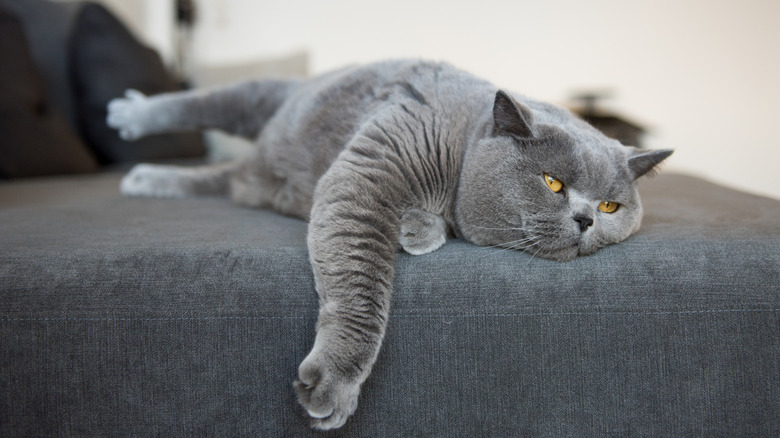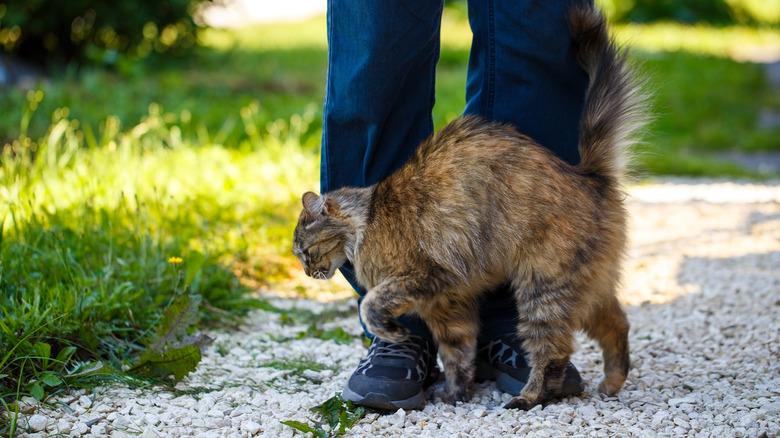Why Your Cat Follows You Everywhere (And When To Be Concerned)
We may receive a commission on purchases made from links.
Cats are notorious for their inquisitive nature, always wanting to get involved and explore when their owners are busy; crafters, sewers, and painters can tell you that a cat can derail a project for a bit of attention. Some felines prefer to keep their distance and observe from afar, others will become 'little shadows' to their favorite people. While a cat tethered to its owner can lead to the occasional awkward step around, it is a normal behavior that can happen for various reasons.
Often, a cat stalking its owner is just looking for some form of attention, whether because it is hungry, wants to play, or longs to be in the presence of its favorite person. Sometimes, a kitty can also find itself bored and looking for stimulation by seeing what its owner is up to or hoping its presence will lead to extra attention. Generally, unless a pet parent explicitly does not want their cat to be 'clingy,' a cat following its favorite human is not a cause for concern.
However, if the root cause of your cat tripping you is boredom, this can also manifest in unwanted behavior, such as clawing a couch or other furniture, over-grooming, bolting through doors, or overeating. Excessive meowing and begging for food in addition may point to underlying issues like diabetes or kidney disease. A cat's tendency to follow its owner is endearing and one of the many traits beloved by pet parents; however, the behavior should be addressed through lifestyle changes or consulting a veterinarian if it comes with underlying issues.
Addressing a cat's boredom can curb its behavior of following its owner
A pet parent may notice other unwanted behaviors in addition to obsessive following, such as clawing, over-grooming, escape attempts, and overeating. In this case, boredom may be the underlying issue. To break up the tedium bringing down a feline, an owner will want to address what their cat is lacking, whether it be mental stimulation, exercise, environmental enrichment, lack of socialization, or separation from a companion.
Thankfully, a concerned caretaker can help enrich their kitty's life in many ways. Cats love heights to observe their kingdom for potential prey or threats. Cat towers allow cats to climb high, but those with restricted space can also grab a more affordable option like the AMOSIJOY Cordless Cat Window Perch, which also gives a front-row seat to the outdoors. Scratching posts are also essential to enrichment; you can make a scratching post at home or buy a stable one such as the Poils bebe L Shape Cat Scratcher.
Physical and mental exercise comes naturally with bonding time with a cat, playing with feather wands, laser pointers, or whatever else catches its fancy. Playtime with a pet parent will also address a cat's need for social interaction. If you are restricted and unable to give the needed playtime, an interactive toy like the Agile Moving Cat Ball can help alleviate a pet's boredom. Variety is key to keeping a cat engaged, and new toys or moving around furniture and towers can perk a cat up. Determining why a cat is bored can make time for bonding while addressing the issue of constant shadowing.
Health issues that can cause a cat to follow its owner
A hungry cat may follow its owner around the house, waiting to be fed. This behavior is typical around dinner time. However, excessive begging can indicate underlying health issues such as hyperthyroidism, diabetes, internal parasites, and certain cancers. If you have ruled out boredom and are concerned that your cat might have other medical problems, a veterinarian can assess the situation and provide appropriate follow-up care. On top of excessive following and begging, visiting a vet should be a priority if a cat displays other symptoms, such as vomiting, loss of appetite, diarrhea, or mobility issues.
Other health issues that can promote obsessive shadowing include pregnancy, a cat in heat, hypertension or cognitive dysfunction in older cats, and hearing or vision loss. Consider having a female cat spayed to avoid pregnancy and unwanted behavior caused by a cat in heat. Issues like cognitive dysfunction and loss of senses can be a natural part of aging but should still be addressed with a veterinarian to provide the best at-home care. A cat who excessively follows an owner can be just a sign of an affectionate kitty. However, addressing any needs or medical issues will ensure a pet parent can just enjoy the adorableness of having a healthy and content little shadow.
Always consult your veterinarian before making changes to your pet's diet, exercise, or care. To find an accredited veterinarian in your area, you can search the American Animal Hospital Association's online database.


